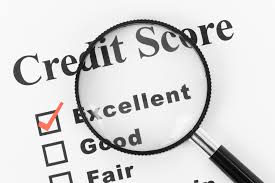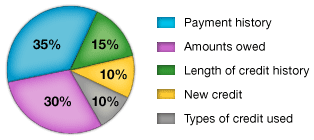Once you have finally gotten yourself out of debt, you will want to make sure that your credit score is in the excellent range: 750-850. This will help you in the future when you need a loan for a car or a house. And it will make the difference- a huge difference in the interest rate the lender gives you.
Everyone should know the basics of how credit scores work. However, I will share a few tips with you below to help you get jumpstarted- or just refresh your memory:
- Most importantly, you will want to get your credit report and make sure that everything is accurate. One time the IRS reported something on our credit that was inaccurate- it dropped our credit score by about 50 points! We were really glad that we had noticed that error or we would have had a really hard time purchasing our home.
- Once a year, you can pull your credit report from the three reporting bureaus: Experian, Equifax and TransUnion. You can do that for free at AnnualCreditReport.com. Check for any mistakes. The report will not give you your actual FICO score though. You have to pay for those. But, if you want to know what that is, you can head to MyFico and purchase your credit score for around $15-$20.
- If you do choose to begin using a credit card, you must be able to pay off that credit card each month in FULL. Once you are out of debt, you don’t want to be paying nasty interest fees, or late fees to your creditors. So, only put on your card what you can pay of each month. Don’t pay the minimum payment… pay it completely off!
- If you are committed and can stick to it, you can use your credit card as your primary method of payment. Choose a credit card that gives you high cash back, travel rewards or other rewards that your family will be able to use. Any money in your checking account you keep un-touched for the entire month. Only use your CC to pay for everything you need. Just MAKE SURE you only charge what you can afford. I can’t stress this enough. Then, at the end of the month, pay off your CC in full with the money in your checking account.
- If you didn’t know, your creditors report to the Credit Bureaus each month… around the last few days of the month. So, the best absolute time to pay off any revolving debt (like the credit card I mentioned in step 4) is before that timeframe. The credit bureau will see that your debt ratio is low, and will see that you had used your card but were able to completely pay it off. And guess what happens? Your credit score will raise!! Just make sure you do this continually and it will look good on your credit.
- Once you are out of debt and have paid off your credit cards, you may be very tempted to close those credit cards or cancel them. Don’t do it!! If you see the “How Credit Scores are Calculated” below, you will see that 10% of your credit score has to do with how long your card has been open. So if you close your credit cards, your score could actually drop- even though you paid them completely off. By leaving them open, they will actually work in your favor. **If you are tempted to use them, take them out of your purse or put them somewhere out of sight.
How is Your Credit Score Calculated?
- 35% is based on payment history. (You can see why paying on time is SO important)
- 30% is based on Outstanding Balances. (If your credit cards are maxed out, or carry high amounts on them, this can look bad to the Credit Bureaus and your chance of repaying them. That is why Step 3 really helps your score go up!)
- 15% is based on the length of your credit history.
- 10% is based on new credit
- 10% is based on types of credit. (How many accounts you have, what types of credit lines you have open)
Credit Score Ranges:
850-750: Excellent Credit (This is where you want to be!)
640-750: Good to Fair Credit
640 and Below: Bad Credit
If you are already out of debt, you might need to just tweak a few things to raise your credit score. If you are still working on it, just do what steps you can in order to help your credit score out as much as you can! I’ve also pinned this post on Pinterest. So if you want to keep it for future use, go ahead!
If you have missed the other Getting Out of Debt Posts, you can find them all here and get caught up! And if you have anything you would love me to talk about in this series, leave a comment below.


Aubri
Thanks so very much. I have already implemented the snowball affect as well. 🙂
Jeanne
Great post! One good trick I discovered is that, when you are on the websites for the various credit reporting agencies, if you click on “Dispute” it will show you your report for free, even if you’ve already viewed it that year. Once you’re looking at the report, that’s where you dispute things, so you can just not dispute anything and view the report only.
Michelle
Creditkarma.com will let you view your FICO score for free.
Emily
Hello!
You said we can head to MyFico and purchase your credit score for around $15-$20.
Does checking your credit score “ding” your score?
My husband used to work at a credit union and that is what he was told.
You can check your report once a year for free but checking the actual score dings your score.
Anyone have any answers or advice for me?
Thanks!
Dee
CreditKarma is great, and it’s free! You have access to your full credit report and your credit score! I get updates every time my credit score changes, credit inquiries are made, and when new accounts are added. These regular updates help me monitor my credit so I’ll know right away if I am a victim of identity theft. Awesome website!